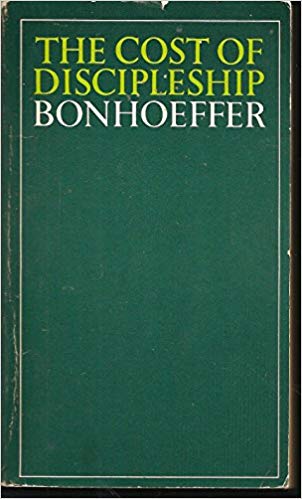I t began with a little green book. I liked the title. The Cost of Discipleship.
t began with a little green book. I liked the title. The Cost of Discipleship.
A friend had given it to me with assurances that I’d love the book. Odd thing is, I don’t even remember the first part of it. I only remember when I got to the contrast between “cheap grace” and “costly grace.”
The words burned into my soul.
Cheap grace is the preaching of forgiveness without requiring repentance, baptism without church discipline, Communion without confession, absolution without personal confession. Cheap grace is grace without discipleship, grace without the cross, grace without Jesus Christ, living and incarnate.
How I understood that idea. I’d seen it all my life. There was always that one person who almost flaunted his or her sinful actions with the assurance that they’d “said a prayer” and grace covered everything he or she did now. It’s as if Paul never said “God forbid!” about something like that.
Later, I saw Bonhoeffer in Michael Phillips’ character, Dieder Palacki. I loved that man decrying our “razzle-dazzle” Christianity, and I could just see that had Bonhoeffer survived WWII, he might have had the same response to the American push to “save” the persecuted church behind the Iron Curtain. (You can find that bit in the “Secret of the Rose” series in Dawn of Liberty—read it. You won’t regret it.)
Another quote that still sings in my heart when I think of Bonhoeffer is:
Fruit is always the miraculous, the created; it is never the result of willing, but always a growth. The fruit of the Spirit is a gift of God, and only He can produce it. They who bear it know as little about it as the tree knows of its fruit. They know only the power of Him on whom their life depends.”
Is it any wonder that when I saw Amanda Barratt had written a fictionalized biography of the story of Maria Von Wedemeyer and Brother Bonhoeffer, that I immediately went to order a copy? Before I could even do that, I was offered a free review copy of My Dearest Dietrich. I accepted with indelicate and mortifying haste. While I think I said, “YES! I’d love to have one,” my brain was really thinking, “Fork it over, woman!”
I confess this now only to show just how excited I was for this book.

Note: links may be affiliate links that provide me with a small commission at no extra expense to you. Additionally, while I was provided with a review copy of the book, I also purchased my own Kindle copy as well.
My Dearest Dietrich: Is It My Favorite Book of the Year?
Well, the year isn’t over, so I can’t say unequivocally, but my tentative answer is a decided yes.
How’s that for wishy-washy? Sorry, can’t help it.
If you don’t know the story of Dietrich Bonhoeffer and his work to bring down Adolf Hitler, it would be best to read up a little on him before reading the book. Readers unfamiliar with him might find the book unsatisfactory, otherwise.
But My Dearest Dietrich offers what I love best in good fiction—heroism, self-sacrifice, faith, and love shown in action rather than effusive protestations of affection.
And Amanda Barratt managed it without yielding to the temptation to create a fast-paced, “whirlwind” style story. That sort of “it’s a war so let’s rush the narrative to give the illusion of tension and speed” would have destroyed this book’s greatest strength. It flows at the natural pace of a couple who must wait, watch, and trust for the Lord’s timing to their lives, and all without prompting the drumming of fingers.
The attention to historical detail couldn’t be more impressive. It became most obvious only when I realized I hadn’t noticed it in the narrative. It’s woven so delicately and deliberately through the story that instead of being slapped over the head with setting, facts, and figures, Barratt simply immerses you into a tale you hope never to emerge from.
And yet, when the story ends, you realize that for it to be the deeply moving, powerful, and life-changing story that it was, it couldn’t have been told any other way. It had to end when and where it did. True stories work like that, and instead of trying to make a true story fit the romantic tropes that the genre demands, Ms. Barratt simply told their tale as God wrote it.
How could it be any better than that?
Recommended for lovers of history, WWII buffs, and for those who cherish the memory of a German theologian who loved Jesus even more than his beloved Maria.
 About My Dearest Dietrich:
About My Dearest Dietrich:
A staggering love illuminating the dark corners of a Nazi prison
Renowned German pastor and theologian Dietrich Bonhoeffer is famous for his resistance to the Nazi regime and for his allegiance to God over government. But what few realize is that the last years of his life also held a love story that rivals any romance novel.
Maria von Wedemeyer knows the realities of war. Her beloved father and brother have both been killed on the battlefield. The last thing this spirited young woman needs is to fall for a man under constant surveillance by the Gestapo. How can she give another piece of her heart to a man so likely to share the same final fate? Yet when Dietrich Bonhoeffer, an old family friend, comes to comfort the von Wedemeyers after their losses, she discovers that love isn’t always logical.
Dietrich himself has determined to keep his distance from romantic attachments.
There is too much work to be done for God, and his involvement in the conspiracy is far too important. But when he encounters a woman whose intelligence and conviction match his own, he’s unprepared for how easy it is to give away his heart.
With their deep love comes risk–and neither Dietrich nor Maria is prepared for just how great that risk soon becomes.
Based on detailed historical research, this true love story is at once beautiful and heartrending. My Dearest Dietrich sheds new light on a world-famous theologian . . . and the woman who changed his life.



Added to wish list!
It sounds very intriguing. I am looking forward to reading it.
Bonhoeffer, (specifically Cost of Discipleship), was a theologian I was introduced to at Barrington College and went in depth at both Drew and UTS. One of my mentors spend years studying both him and Martin Buber.
As for My Dearest Deitrich, I’m intrigued